Alleged Spy for Japan and Soviet Union
According to historical records and research by the late Chinese civil scholar and historian Lyu Jiaping, not only was Jiang’s father a traitor during the Japanese occupation of China in World War II, but Jiang himself was also a spy for Japanese imperial military intelligence.Jiang Shijun, Jiang’s biological father, joined the “Peace Salvation Congress” organized by the Japanese occupation force and its Chinese collaborators in 1938. After the fall of Nanjing, he worked for the collaborators’ “Nanjing Temporary Maintenance Association” and for the Japanese.
Relying on his father’s connections, Jiang enrolled in the Department of Electrical Engineering at Central University’s Engineering College in Nanjing. During that time, he joined the college’s youth cadre training class established by a Japanese spy chief in China, and was trained as a spy to monitor other Chinese students, according to Lyu.
Jiang went to the Moscow Stalin Automobile Factory in the Soviet Union for an internship from 1955 to 1956. The Soviet National Security Council (KGB) discovered Jiang’s history as a traitor and developed him into a KGB spy of its Far East Bureau, according to the historian. After returning to China, Jiang maintained a connection with the KGB and became a Soviet spy hidden in the CCP. In order to cover up this dark history, Jiang signed a secret treaty with Russia, selling out Chinese territories.

In December 1999, Jiang and the visiting Russian President Boris Yeltsin signed the “Protocol on the Narrative Protocol between the Government of the People’s Republic of China and the Government of the Russian Federation on the East and West Sections of the Sino-Russian Boundary” in Beijing. He signed another treaty with Russian President Vladamir Putin in 2001, the “Sino-Russian Treaty of Good-Neighborliness, Friendship and Cooperation.”
Came to Power After Tiananmen Massacre
The CCP’s official obituary mentions Jiang’s role during the Tiananmen massacre on June 4 in 1989, saying that Jiang “supported and implemented the CCP’s stand against unrest” and “effectively maintains Shanghai’s stability.”During the democratic movement and mass protests in 1989, Jiang was summoned to Beijing because he purged the “World Economic Herald” publication in Shanghai, which supported the student movement, and gained the favor of former CCP leader Deng Xiaoping. After the movement was violently suppressed by the regime’s military, Jiang was appointed as the new leader of the CCP.

After the Tiananmen massacre, the CCP faced sanctions and blockades from the democratic world led by the United States. Jiang pledged to improve human rights in exchange for trade benefits with the West, a promise that would go unfulfilled.
Meanwhile, he launched a nationalistic education and propaganda campaign to manipulate Chinese public opinion and sentiment against the West.
Corruption
Since Jiang’s era, all levels of the CCP and its military had been saturated with an unprecedented level of corruption. It had become common practice to amass wealth frantically through all means from top to bottom. Systemic corruption is now a hallmark of CCP rule.Persecuting Falun Gong
When Jiang was in power, he vigorously suppressed dissidents, especially Falun Gong practitioners.Falun Gong, a traditional spiritual practice based on the principles of truthfulness, compassion, and forbearance, rapidly gained popularity in China in the 1990s after it was made public. The practice has been widely praised for improving physical fitness and social morality. Falun Gong has a large number of adherents across all social strata in China, which triggered Jiang’s resentment.

Jiang stepped down from the CCP leader position in 2002, and was replaced by Hu Jintao. However, experts believe that Jiang has been controlling China’s political situation from behind the scenes. Many officials of the Jiang faction are in actual control taking orders from Jiang, which made Hu a figurehead.

Died in ‘Shame’
Chen Yonglin, a former CCP diplomat, told The Epoch Times on Nov. 30, “As a butcher of people, Jiang Zemin died with humiliation and shame.” He believed that not only Jiang but also the CCP should be held accountable for the crimes they have committed. “Because although Jiang is dead, it’s not over yet. As long as the Communist Party is still there, the persecution of religion and human rights will not stop. Not only Falun Gong is being persecuted, now the regime’s ‘zero-COVID’ policy has caused people all over the country great suffering.”Feng Chongyi, associate professor in China Studies at the University of Technology, Sydney, pointed out: “Jiang Zemin’s suppression of Falun Gong has been written in history, with shame, and he will never escape from this crime. He has committed crimes against humanity.”
Wang Xing, a former engineer from a state-owned enterprise in mainland China, said that death is the easy way out for Jiang, as “the best ending should be bringing Jiang Zemin to justice,” he said.




